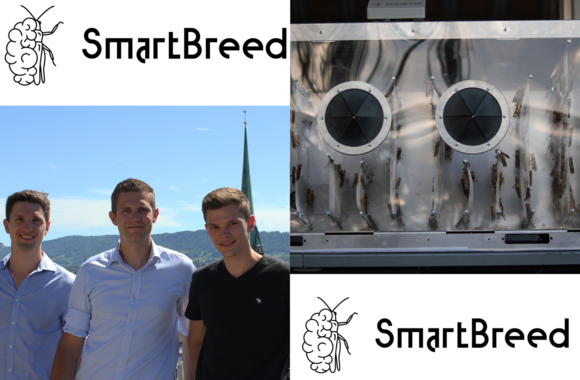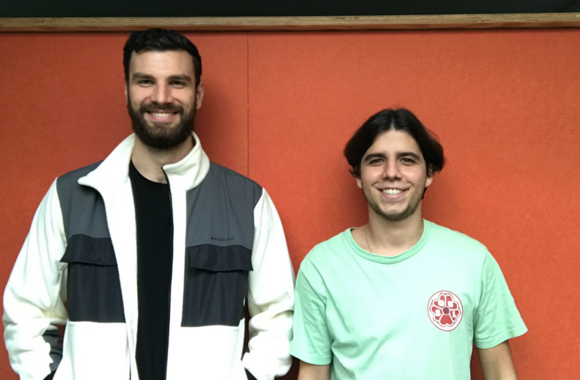We are proud to introduce you to the selected participants of the Food Innovation Challenge:
Could you introduce you, please?
The team behind SmartBreed are three young and dynamic brothers who complement each other perfectly in their interests, views, and career paths. Christoph has worked for more than four years as a strategy consultant for industrial and technology companies. He has experience in investment banking and holds a Bachelor's degree in Economics from the University of St. Gallen (HSG) and a Master's degree in Banking and Finance from London. Adrian holds a Master's degree in Nanotechnology from the University of Basel. He wrote his Master's thesis at Harvard University in Boston and is currently pursuing his PhD in bioengineering at ETH Zurich. Patrik holds a Bachelor's degree in law from the HSG and has worked in a legal department for one year. Due to the versatile background of our team members we are able to cover several perspectives of a problem to create novel solutions.
What is the problem you are trying to solve and where are you standing now?
SmartBreed is a Swiss AgriTech start-up that offers insect breeders a local and complete breeding solution to make insect breeding industrially available and economically attractive. To do so, we have developed a fully automated grasshopper breeding box, which makes it possible for Zoos and the food and animal feed industry to produce food-grade grasshoppers very cost-effectively, hygienically, and efficiently. SmartBreed wants to make the economy more circular and sustainable with its insect breeding boxes by converting local agricultural waste into high-quality proteins and fertilizers.

Could you introduce you, please?
Our team consists of Gregory Frei and Moritz Müller. We are both from Zurich and have been friends for nearly a decade now. We are currently both completing our master’s degree in Business Innovation at HSG. Moritz’s background is in the event industry, where he has organised and managed events for a total of over 15’000 people, which has enabled him to follow through his social endeavors leading to donations of around 40’000 CHF to diverse charitable foundations. Gregory has a diverse background in banking, gastronomy, and has also already made first entrepreneurial experiences by working in a food & beverage start-up. In his time as a sales and event employee at the Swiss start-up mikks, he learned how to best describe the benefits of a product and how to translate these benefits into a profitable business value.
What is the problem you are trying to solve and where are you standing now?
The overarching problem at hand is the massive amount of food waste and the underlying lack of efficiency in food production. At the same time, an increasing number of end consumers are shifting their demands to sustainable nutrition, however, there is a lack of healthy, great-tasting, affordable, and sustainable whole food on the market.
KLY enables the redistribution of nutrition for humanity by transforming potential food waste streams into great tasting, disease-fighting whole foods while tackling environmental as well as health issues through an innovative and sustainable approach to eliminate existing resource inefficiencies. Through a lengthy market screening process as well as numerous interviews and questionnaires we were able to create a customer-centric, sustainable problem-solution-fit in line with several of the UN Sustainable Development Goals: KLY – the bran-based crispbread sourced only from Swiss ingredients and upcycled potential food waste.

Could you introduce you, please?
We're two Master’s candidates at the University of St. Gallen (HSG) - Miguel from Guatemala and Sebastiao from Portugal. We are passionate entrepreneurs and are both looking to create a lasting change in the world.
How did you get the idea?
The idea came about during an ideation process for the food innovation challenge. During the research phase, we found several food trends that we believe are going to change 21st-century habits. Consumers are ever more concerned about alternative sources of nutrition that are organic, ensure sustainability, promote healthy diets, contain alternative proteins, and can eat throughout the day (for example snacks). With this trend in mind, we connected the dots that hummus, one of the preferred sources of protein for vegetarians, takes too long to prepare, requires special equipment, and has a very short shelf life. With our instant hummus idea, we aim to solve these pain points.
What is the problem you are trying to solve?
There are two opposing forces pulling people in different directions; on one side, people want to eat healthily and be sustainable. On the other side, this is expensive and inconvenient for our fast-paced lives. Hummus is cheap, sustainable, and healthy, and we aim to make it more accessible and easier to consume.
Where are you standing now?
Right now, we are in the profiling stage and have identified who our customer is, and we are now testing how well our product solves the pain points of those customers.